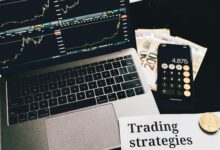How Technology is Changing the Trading Market

Technological developments have changed every facet of the trading scene, rendering it quicker, smarter, and more accessible than it was a few years ago. Once dominated by human intuition and hand computations, markets today flourish on sophisticated algorithms, real-time data analysis, and digital platforms operating at lightning speed. Traders now have access to tools and systems that were unthinkable just a few decades ago, resulting in a landscape in which innovation drives competition. This evolution has altered not only how trading is conducted but also who can participate and succeed in the market.
The Rise of Algorithmic Trading and Its Dominance in Market Operations
By replacing data-driven precision with human-driven judgment, algorithmic trading has transformed the trading scene. Using mathematical models, these systems examine enormous volumes of market data in real time to find attractive prospects and carry trades in fractions of seconds. Institutions and individual traders alike favor this approach because it removes emotional bias and guarantees consistency in trading strategies. Because algorithmic trading speeds up transactions with minimal fluctuation in prices, it has also improved market liquidity. Traders who embrace this technology have a big advantage over those who depend just on conventional techniques as the market becomes increasingly reliant on algorithms.
Artificial Intelligence and Its Role in Predictive Analytics
Modern trading increasingly revolves around artificial intelligence (AI), which enables players to make sound decisions grounded on predictive analytics. Processing real-time and historical data, artificial intelligence systems identify trends, forecast market shifts, and generate useful insights. Unlike conventional research, artificial intelligence learns and adapts constantly, raising its accuracy with time. For traders, this means obtaining access to insights previously unachievable by manual analysis. Risk management technologies offered by artificial intelligence have also given traders real-time estimates of possible losses, therefore enabling proactive strategy adjustment. The applications of artificial intelligence in trading will grow as it develops and provides increasingly more advanced instruments for market analysis and decision-making.
Blockchain Technology and Its Impact on Transparency and Security
Unmatched degrees of security and transparency brought about by blockchain technology are changing the trade environment. Blockchain stores transactions in a method that is both unchangeable and publicly available as a distributed ledger, therefore lowering the possibility of fraud and manipulation. In marketplaces like cryptocurrency trading, where trust is absolutely crucial, this invention is especially valuable. Blockchain also simplifies settlement procedures, therefore allowing almost immediate asset transfers and less dependence on intermediaries. Blockchain technology is opening a more safe and effective trading environment by eliminating inefficiencies and boosting trust. Adopting blockchain-based technologies is becoming a necessary action for both institutions and traders to stay competitive.
The Digitalization of Prop Trading Firms and Its Influence on Market Accessibility
Commonly referred to as prop trading firms, proprietary trading companies have experienced a digital revolution that has opened professional trading prospects to more people. These companies use modern technologies to give traders platforms, tools, and capital, therefore enabling them to execute high-stakes strategies free from personal financial risk. Prop trading companies have established an ecosystem whereby traders may concentrate just on strategy by combining real-time analytics, artificial intelligence-driven insights, and automated tools. Along with increasing the personnel pool, this digital change has created a meritocratic environment in which innovation and competence define success instead of financial capability.
The Role of Mobile and Cloud-Based Platforms in Real-Time Trading
Because they let users interact with the market anywhere, anytime, mobile and cloud-based platforms have transformed trading. These systems give traders real-time access to market data so they can easily monitor their positions, execute trades, and analyze trends with ease. By means of cloud technology, these systems guarantee their scalability and dependability even in times of great market volatility. For traders, this level of accessibility is game-changing because it eliminates the need for expensive hardware and dedicated trading floors. Mobile and cloud-based platforms have blurred the boundaries between professional and retail trading by enabling people to be always connected to the market, therefore generating a more inclusive and dynamic market environment.
Conclusion
Technology has fundamentally changed the trading market and produced a dynamic, highly competitive environment where innovation and adaptation rule. From the transparency of blockchain to the accuracy of algorithmic trading, each development has contributed to a more accessible and effective market. Traders who embrace these technological changes set themselves to flourish in a setting defined by ongoing development. These innovations will continue to shape the future of trading, creating even more opportunities for those willing to use tomorrow’s tools.





